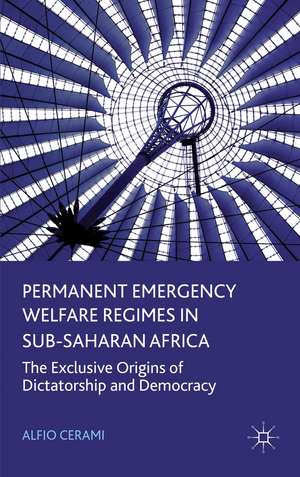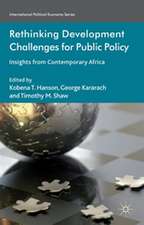Permanent Emergency Welfare Regimes in Sub-Saharan Africa: The Exclusive Origins of Dictatorship and Democracy
Autor Alfio Ceramien Limba Engleză Hardback – 18 mar 2013
| Toate formatele și edițiile | Preț | Express |
|---|---|---|
| Paperback (1) | 384.86 lei 6-8 săpt. | |
| Palgrave Macmillan UK – 2013 | 384.86 lei 6-8 săpt. | |
| Hardback (1) | 391.61 lei 6-8 săpt. | |
| Palgrave Macmillan UK – 18 mar 2013 | 391.61 lei 6-8 săpt. |
Preț: 391.61 lei
Nou
Puncte Express: 587
Preț estimativ în valută:
74.94€ • 77.77$ • 62.64£
74.94€ • 77.77$ • 62.64£
Carte tipărită la comandă
Livrare economică 17-31 martie
Preluare comenzi: 021 569.72.76
Specificații
ISBN-13: 9780230299795
ISBN-10: 0230299792
Pagini: 270
Ilustrații: XVIII, 270 p.
Dimensiuni: 140 x 216 x 23 mm
Greutate: 0.5 kg
Ediția:2013
Editura: Palgrave Macmillan UK
Colecția Palgrave Macmillan
Locul publicării:London, United Kingdom
ISBN-10: 0230299792
Pagini: 270
Ilustrații: XVIII, 270 p.
Dimensiuni: 140 x 216 x 23 mm
Greutate: 0.5 kg
Ediția:2013
Editura: Palgrave Macmillan UK
Colecția Palgrave Macmillan
Locul publicării:London, United Kingdom
Cuprins
Introduction: Permanent Emergency Welfare Regimes in Sub-Saharan Africa 1. Theoretical Framework: Democracy, System Transformation and Welfare Regimes PART I: KEY ISSUES AND PARAMETERS 2. Pathways of Development 3. Systemic Problems and Structural Challenges 4. Poverty and Human Development PART II: SOCIAL PROTECTION 5. Labour Market, Poverty Relief and Health 6. Education, Child Protection, and Gender Equality 7. Hunger, Food Security, Safe Water and Sanitation PART III: SOCIAL CONFLICTS, MODERNIZATION AND DEMOCRATIZATION 8. Social Conflicts and the Politics of Inequality in Sub-Saharan Africa 9. Democratization and Consolidation of Democratic Institutions Conclusions: The Exclusive Origins of Dictatorship and Democracy
Recenzii
"Alfio Cerami makes us painfully aware of the pivotal importance of wide-ranging social welfare programs for democratization projects everywhere. He deftly demonstrates how 'emergency welfare regimes' produce different outcomes in diverging contexts of Sub-Saharan Africa and offers valuable theoretical insights that would be of great interest to scholars, policy experts, international NGOs, and a growing number of students of this long-neglected region." - Tomasz Inglot, Professor in Political Science, Minnesota State University, USA
"Welfare state studies only rarely embrace the development of social policy in Africa. In this highly stimulating book Cerami not only shows how to describe and understand Sub-Saharan permanent emergent welfare regimes, he is also able to demonstrate the necessity of combining insight from a variety of approaches including welfare state analysis and political science, but also to combine it with enormous insight into pitfalls and dilemmas for Africa's development, and suggestions for future path-ways." - Bent Greve, Professor in Welfare State Analysis, University of Roskilde, Denmark
"A milestone. This study sheds not only vivid light on a largely blind spot of the welfare regime research hitherto. It also connects the broad empirical analysis on Sub-Saharan Africa with an ambitious concept building on the nexus of development economics, social protection and democratization. Alfio Cerami's profound study reveals once againthe close relationship between public welfare and the conditio humana in contemporary societies wherever they are located."
- Raj Kollmorgen, Associate Professor in Sociology, University of Magdeburg, Germany
"Welfare state studies only rarely embrace the development of social policy in Africa. In this highly stimulating book Cerami not only shows how to describe and understand Sub-Saharan permanent emergent welfare regimes, he is also able to demonstrate the necessity of combining insight from a variety of approaches including welfare state analysis and political science, but also to combine it with enormous insight into pitfalls and dilemmas for Africa's development, and suggestions for future path-ways." - Bent Greve, Professor in Welfare State Analysis, University of Roskilde, Denmark
"A milestone. This study sheds not only vivid light on a largely blind spot of the welfare regime research hitherto. It also connects the broad empirical analysis on Sub-Saharan Africa with an ambitious concept building on the nexus of development economics, social protection and democratization. Alfio Cerami's profound study reveals once againthe close relationship between public welfare and the conditio humana in contemporary societies wherever they are located."
- Raj Kollmorgen, Associate Professor in Sociology, University of Magdeburg, Germany
Notă biografică
Alfio Cerami has been Research Associate at the Centre d'études européennes at Sciences Po, France and an international consultant for the UNICEF. He has also held appointments at University of Erfurt, Germany, at the Centre for German and European Studies of the State University of St Petersburg, Russia and at Southern Methodist University in Paris, France. His research concentrates on how political, economic, and social transformations influence the process of democratization and of consolidation of democratic institutions.















